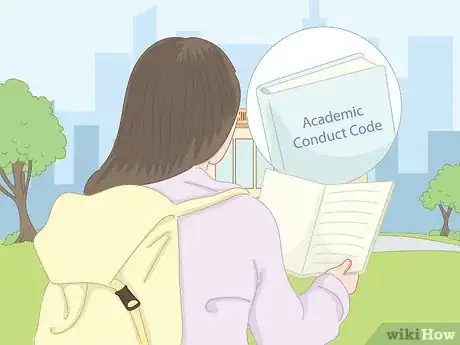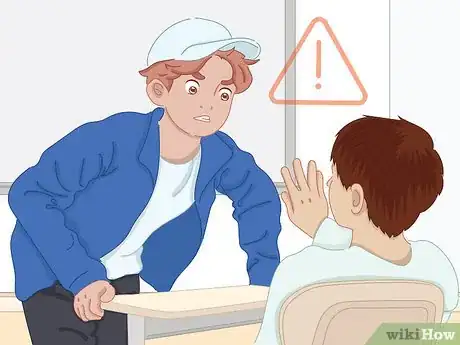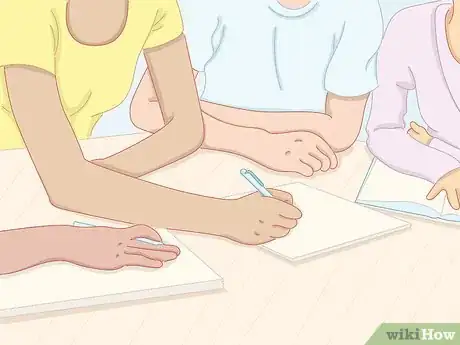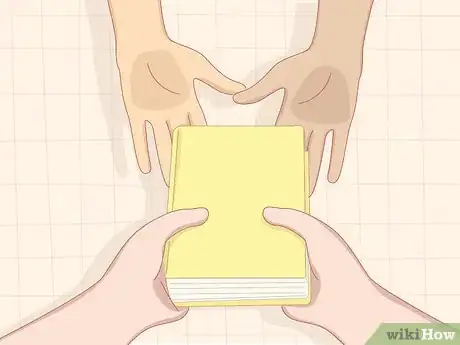This article was co-authored by Emily Listmann, MA. Emily Listmann is a private tutor in San Carlos, California. She has worked as a Social Studies Teacher, Curriculum Coordinator, and an SAT Prep Teacher. She received her MA in Education from the Stanford Graduate School of Education in 2014.
This article has been viewed 105,403 times.
If you're a responsible and hardworking student, then it's likely your peers have asked for your homework answers. You may be tempted to break the rules and share your answers because of social pressure, but this hurts both you and the person who copies you. Protecting your answers from would-be cheaters is the right thing to do, and actually helps them become better students in the long run. You can prepare to resist peer pressure and avoid cheating by learning ways that you can say "no" to other students, as well as how to manage their expectations of you. Finally, you may want to consider starting a study group that allows you and your peers to learn together. It'll all be more productive for you and your friends.
Steps
Saying No
-
1Say no explicitly. It can be difficult to say no, especially when you want to seem friendly. Avoid giving an incomplete, impotent, or unclear refusal.[1] Practice direct statements like these in advance: “I don’t want to give you my answers,” or “I won’t let you use my work.”
- You may accidentally encourage your classmate to apply more pressure if you soften your “no” in an attempt to be friendly. Avoid using statements like “I don’t know” or “this may be a bad idea.” Instead, trust the clarity and power of a direct “no.”
- Do not provide a complicated answer, just say no. A complicated explanation that emphasizes unusual circumstances may seem friendlier or more helpful, but it can provide an opportunity for your classmate to challenge your refusal and to ask again.
-
2Repeat yourself. Prepare to say no a second or third time. Your refusal is simple, but it may take your classmate a few attempts to understand that you are serious. Politely let them know that your answer is final but acknowledge their persistence.[2]
- You can say “I know this is important, but my answer is not going to change,” or “I know that you are worried about grades, but I never share my answers.”
- If you feel yourself weakening, remind yourself of the consequences you could face if you're caught sharing answers. Your teacher could deny you credit for the work you've done since by sharing your work you've engaged in cheating.
Advertisement -
3Call your classmate’s request cheating. Be direct and specific the first time your classmate asks you to share your answers. Tell them “What you are asking is cheating, and it is wrong.” Your classmate may try to convince you that their request is not cheating. You can make your position clear by saying “I see your request as wrong, regardless of how you view it.”
-
4Articulate the consequences. Remind your classmate of the repercussions of cheating. Teachers know and look for common cheating habits. Punishments for cheating can range from failing an assignment, to failing a course, to being expelled. Make clear that these consequences could affect both your classmate and you if you facilitate their cheating. You can say “You are asking me to take a risk, and the potential penalty is too big.”
- Remember that the long term repercussions outweigh the immediate pressure. A school year can seem like a very long time, and you may worry about awkward situations if you disappoint a classmate. If you say no to a classmate, you may feel uncomfortable for a few days or weeks. If you are caught cheating, the consequences can last for years.
- Point out to the student that the consequences remain even if you don't get caught. Copying homework answers doesn't help you learn the information, so the student who copies you won't be prepared for bigger assignments, such as the upcoming test. Even if they don't get caught now, they may not pass the course if they fail the test.
-
5Read your school’s academic conduct code. You will be able to explain why you will not share your work when you are familiar with the specific rules of your school. Your teachers, school administrators, and parents are all concerned about cheating and work very hard to uphold these standards.[3]
- Pay careful attention to your school’s rules regarding plagiarism. Plagiarism can seriously damage your academic record. Since what counts as plagiarism may not always be instinctive, speak with your teacher to clarify confusions that you may have. Your teacher will appreciate the opportunity address these questions before potentially plagiarized work is submitted.
-
6Avoid physical confrontation. Some classmates may refuse to take no for answer. If you are physically threatened, share your answers to avoid immediate danger. Once you are free of immediate danger, contact a school official or a police officer and explain the situation to your teacher. Stopping bullying is a more immediate concern than cheating.
-
7Know that you're doing the right thing. Saying "no" to others is hard, especially if they're your friend. However, the best decision that you can make for both you and the person who wants to copy you is to keep your work to yourself. You worked hard on this assignment and deserve the credit for completing it. Similarly, they deserve the opportunity to learn the material and be successful in the class, which won't happen if you're giving them the answers to the homework.
- Remember, if the other student doesn't do the homework, then they aren't learning the course material. Most likely, they will fail the big assignments, such as tests.
- Keep in mind that sharing answers would make you guilty of cheating, as well. You could jeopardize your future if you decide to share your answers.
Managing Your Classmates’ Expectations
-
1Avoid bragging about your academic performance. While it's good to have a reputation for being a good student, it can also make you a magnet for would-be cheaters. Instead, present yourself as an honest, hardworking student. People at your school will view you as academically successful but unlikely to engage in any type of cheating, including sharing answers.
- When discussing your progress, highlight the effort you're putting into the class, but acknowledge that you won't know how well you know the subject until after your work is graded. Say, "I'm taking good notes and reading the material, but I won't know if my answers are right until I get my paper graded."
- Keep your homework concealed until the moment it is due. Discourage your classmates from asking for your homework answers by not publicizing it. If someone asks you for answers to homework that isn't due for quite a while, you can always lie that you haven't finished it yet.
-
2Express appreciation. Accept your classmate’s interest in your work as a compliment. Peers may use praise in an attempt to manipulate you, so acknowledging the compliment can disarm their attempt to pressure you.[4] Be prepared with a gentle reminder of the dedicated work you did to succeed, like “I’m flattered that you think my work is good, I study very hard.” If they continue to push, say “I worked hard and it is unfair that you get the answers without doing the work yourself.”
-
3Sympathize with your classmate. You do not need to condone your classmate’s attempt to cheat, but you can try to understand why they feel the need take advantage of your success.[5] Say to your classmates “I won’t give you my answers, but I understand how stressful this class is.” Emphasize that you are willing to help them manage the stress of homework.
- Anticipate cheating around test times. Due to the high value placed on providing specific answers for assigning grades, stress can increase before major tests. This may make cheating seem more attractive. Before a test or major assignment, encourage a student that may ask you for answers or offer to study with them. This may reinforce proper study habits and discourage cheating.
Creating a Study Group
-
1Explain rather than cheat. You can reinforce your own understanding of the subject by helping your classmates improve their understanding of the homework or lab work. Start by asking “Was there a specific part of the assignment you had trouble with?” You can also diminish the number of classmates that look to you for answers if they know that your help requires that they work.
- Ask your classmate about their study habits. You may be able to explain how they can do homework more effectively.
-
2Propose collaboration. Offer to work with the student that will not leave you alone. You can involve other students in a discussion of the more confusing parts of the assignment. Say “I find this subject difficult as well,” and focus on discussing the challenging points of the assignment. Be ready to answer their request for help with an alternative: “I won’t give you answers, but we can try to work together through a problem I didn’t finish.” Or answer their request by asking about their work: “Show me your work for the parts you did complete.”
- Pay special attention not to emphasize the depth of your understanding. Your goal is to work with the student, not to give them answers. Make sure that they are actively involved.
-
3Express interest in the work of your peers. Ask “What parts of the assignment were you comfortable with?” Make sure you ask questions of each member of the group. While discussing the assignment, be sure to ascertain the depth of your peers' understanding. This conversation is the start of a potential study group that can make your classmates less dependent on your help.[6]
-
4Direct conversation to the homework assignment. Once the conversation gets going, direct the group to the first step of the first problem. You can say “Hey, that sounds like a good way to solve the first question.” Make sure that everyone is involved, even if it slows the process down. Interject small pointers in order to direct the group to the right answer, and give everyone a chance to understand each step.
-
5Guide the study group. Encourage the impromptu group to work together. Point out that they are covering challenging points. Use your grasp of the topic to steer everyone to a consensus and then confirm "Yeah, that's what I got."
-
6Encourage your peers to repeat the collective study effort. If you would like to work with them, offer to organize the study group. If you would like to continue studying independently, say “Hey, you guys can keep working together! With this study group, you can be sure that you’ll always complete your homework.” Praise their efforts and minimize your role so that they will be confident even without your leadership.
-
7Tell the teacher that a study group has formed. The teacher’s recognition will help solidify the group, and it will emphasize each student’s responsibility for participating. Make your collective intentions clear and accept any guidance or help that your teacher may offer. Many high school teachers approve of study groups, and in college they are often the norm.
Community Q&A
-
QuestionWhat do I do if everyone in class is trying to cheat off me?
 Community AnswerMake yourself a less attractive cheating target. Don't say anything about how many As you're getting. Don't make any homework public until very shortly before it's due, and if someone asks for your answers before then, just say that you haven't had time to work on it yet. If they pester you nearer the time, politely but firmly tell them no. More details on this are in Method 1 of this article.
Community AnswerMake yourself a less attractive cheating target. Don't say anything about how many As you're getting. Don't make any homework public until very shortly before it's due, and if someone asks for your answers before then, just say that you haven't had time to work on it yet. If they pester you nearer the time, politely but firmly tell them no. More details on this are in Method 1 of this article. -
QuestionOne of my classmates that I had a crush on keeps asking me to give him the answers for the homework. What should I do?
 Community AnswerDo not give him the answers. He's trying to take advantage of you. Offer to help him with his studies if he doesn't understand, but don't cheat. It won't make him like you more and you'll both get in a lot of trouble if the teacher finds out.
Community AnswerDo not give him the answers. He's trying to take advantage of you. Offer to help him with his studies if he doesn't understand, but don't cheat. It won't make him like you more and you'll both get in a lot of trouble if the teacher finds out.
Warnings
- Being an accomplice to cheating is usually punished as harshly as cheating. If you feel that your study group may be close to being a cheating ring, immediately seek consultation from a trusted adult.⧼thumbs_response⧽
- Be sure that the teacher knows about your study group. Otherwise, when a few students miss the same questions on an assignment, the teacher will assume cheating has taken place.⧼thumbs_response⧽
References
- ↑ https://psychcentral.com/lib/learning-to-say-no
- ↑ https://psychcentral.com/lib/learning-to-say-no
- ↑ http://www.educationworld.com/a_admin/admin/admin375.shtml
- ↑ https://www.psychologytoday.com/blog/evolution-the-self/201401/praise-manipulation-6-reasons-question-compliments
- ↑ http://eric.ed.gov/?id=EJ720382
- ↑ https://www.theguardian.com/education/2009/jun/09/how-to-be-a-student-study-group











































































